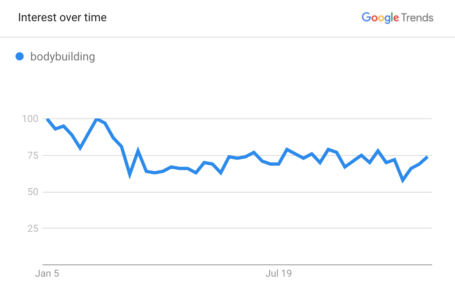
To improve SEO for your blogs, consider seasonality for your keywords.
This goes beyond the obvious like more transactional queries during the holiday season.
For example, the screenshot above shows a trend line for bodybuilding. It peaks early, when many have a resolution to become fit, yet declines over time.
To address seasonality, simply enter the main keyword summarizing your blog into Google Trends. You can download a CSV file with this data so as to include it within your content calendar. This will help to determine the optimal timing for any topic.
Seasonality is more than a higher search volume around a certain period; search intent behind keywords may shift.
Therefore, research competitors within the search results for your most important keywords, taking notes on what ranks well to include for the next year!
Many falsely attribute seasonality to Google algorithm updates or competitor initiatives, so considering seasonality not only boosts SEO but helps you to understand why rankings shift as well.
Extra tip: Google suggests making seasonal pages evergreen, with updates applied to the same URL each year. This means revising existing content versus creating new pages. Try creating an evergreen content hub instead of just a new blog post for the most popular topics.
